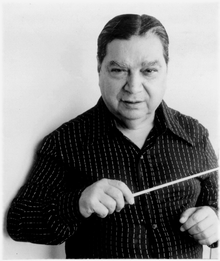César Guerra-Peixe: Difference between revisions
Content deleted Content added
Jerome Kohl (talk | contribs) no longer a problem |
KolbertBot (talk | contribs) m Bot: HTTP→HTTPS (v485) |
||
| Line 10: | Line 10: | ||
'''César Guerra-Peixe''' (March 18, 1914 – November 26, 1993) was a Brazilian violinist, composer, and conductor. |
'''César Guerra-Peixe''' (March 18, 1914 – November 26, 1993) was a Brazilian violinist, composer, and conductor. |
||
Guerra-Peixe was born in [[Petrópolis]], son of Portuguese immigrants with [[Romani people in Portugal and Brazil|Romani]] origins. His music can be heard in many Brazilian films, such as ''Terra é Sempre Terra'', ''O Canto do Mar'', ''Quero Essa Mulher Tanto Assim'', ''Riacho de Sangue'', ''Meu Nome é Lampião'', and ''Soledade''.<ref>"[ |
Guerra-Peixe was born in [[Petrópolis]], son of Portuguese immigrants with [[Romani people in Portugal and Brazil|Romani]] origins. His music can be heard in many Brazilian films, such as ''Terra é Sempre Terra'', ''O Canto do Mar'', ''Quero Essa Mulher Tanto Assim'', ''Riacho de Sangue'', ''Meu Nome é Lampião'', and ''Soledade''.<ref>"[https://www.imdb.com/name/nm0670626/ Guerra Peixe]", IinternetMovieDatabase (Accessed 23 August 2011).</ref> |
||
As an ethnomusicologist, he wrote an important book ''Os Maracatus do Recife'' (1955, second edition 1980) on [[maracatu]]. He died in [[Rio de Janeiro]].<ref>Gerard Béhague, "Guerra-Peixe, César", ''The New Grove Dictionary of Music and Musicians'', second edition, edited by [[Stanley Sadie]] and [[John Tyrrell (professor of music)|John Tyrrell]] (London: Macmillan Publishers, 2001).</ref> |
As an ethnomusicologist, he wrote an important book ''Os Maracatus do Recife'' (1955, second edition 1980) on [[maracatu]]. He died in [[Rio de Janeiro]].<ref>Gerard Béhague, "Guerra-Peixe, César", ''The New Grove Dictionary of Music and Musicians'', second edition, edited by [[Stanley Sadie]] and [[John Tyrrell (professor of music)|John Tyrrell]] (London: Macmillan Publishers, 2001).</ref> |
||
Revision as of 20:14, 28 June 2018
César Guerra-Peixe | |
|---|---|
 | |
| Born | César Guerra-Peixe 18 March 1914 Petrópolis, RJ, Brazil |
| Died | 26 November 1993 |
| Occupation(s) | Violinist, composer and conductor |
César Guerra-Peixe (March 18, 1914 – November 26, 1993) was a Brazilian violinist, composer, and conductor.
Guerra-Peixe was born in Petrópolis, son of Portuguese immigrants with Romani origins. His music can be heard in many Brazilian films, such as Terra é Sempre Terra, O Canto do Mar, Quero Essa Mulher Tanto Assim, Riacho de Sangue, Meu Nome é Lampião, and Soledade.[1]
As an ethnomusicologist, he wrote an important book Os Maracatus do Recife (1955, second edition 1980) on maracatu. He died in Rio de Janeiro.[2]
Discography
- Jornada da Lapinha nº 1/Jornada da Lapinha nº 2 (1955) Copacabana 78
- Chora na rampa (1959) Chantecler 78
- Cidade Maravilhosa/Menina-moça (1960) Chantecler 78
- Vassourinhas (1961) Chantecler 78
- Escuta, Levino/Quarta-feira de cinzas (1962) Chantecler 78
- Sambas clássicos ( S/D) Chantecler LP
- Sedução do norte (1978) RGE/Fermata LP
- A retirada da Laguna. Orquestra Sinfônica Nacional da Rádio MEC (1997) CD
- Eliane Tokeshi e Guida Borghoff - Guerra-Peixe: Obras Para Violino e Piano (YB Music, 2011)
References
- ^ "Guerra Peixe", IinternetMovieDatabase (Accessed 23 August 2011).
- ^ Gerard Béhague, "Guerra-Peixe, César", The New Grove Dictionary of Music and Musicians, second edition, edited by Stanley Sadie and John Tyrrell (London: Macmillan Publishers, 2001).
Further reading
- Béhague, Gerard. 1979. Music in Latin America: An Introduction. Englewood Cliffs, NJ: Prentice-Hall. ISBN 0136089194 (cloth); ISBN 0136089011 (pbk).
- Mariz, Vasco. 1994–95. "César Guerra-Peixe (1914–1993)". Inter-America Music Review 14, no. 1:169–70.
Categories:
- 1914 births
- Brazilian composers
- Brazilian violinists
- 1993 deaths
- People from Petrópolis
- Brazilian conductors (music)
- Brazilian film score composers
- Male film score composers
- Ethnomusicologists
- Brazilian people of Portuguese descent
- Brazilian people of Romani descent
- Romani musicians
- 20th-century conductors (music)
- 20th-century violinists
- 20th-century composers
- Brazilian composer stubs
